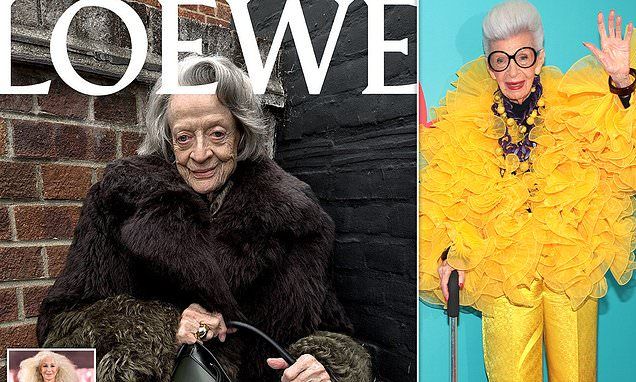Who would have thought it? But there she is, our brilliant Dame Maggie Smith, star of the new advertising campaign for fashion house Loewe.
Dame Maggie poses against a brick wall in an oversized, shaggy brown shearling coat clutching Loewe’s best-selling Puzzle bag. In another, she wears a wide-skirted black and white dress, and in a third a rather more conventional high-necked, blue silk shirt.
Master-minded by creative director Jonathan Anderson and photographer Juergen Teller, there is no attempt to retouch the lines on her face, nor the bony fingers of old age. Indeed her age — 88 — is the whole point. Witness the public reaction. Four other, lesser-known, young faces were photographed for the same campaign, but they have provoked no publicity, while Dame Maggie’s appearance has been greeted with social media shrieks of joy.
It is all part of a current trend — the use of old age to add a new and unexpected element to fashion images. Stick a traditionally-attractive young male or female model in a new collection, and what is there to say? It’s just so blah. But fling an octogenarian national treasure into a campaign and you have a story.







Choosing Dame Maggie, an actress of world-wide fame thanks to her starring role as the Dowager Countess of Grantham in Downton Abbey and as Professor McGonagall in Harry Potter, rather than her incandescent stage appearances over six decades, is a very clever way to ramp up the conversation about an old brand like Loewe.
But it’s not just Loewe. In the past year there’ve been countless pairings of older women and fashion houses, a trend kicked off by Phoebe Philo in 2015 when she was at Celine. Philo used the then 80-year-old Joan Didion as a model in her sunglasses campaign. Didion in her time was not only a fabulous writer, but regarded as an extremely stylish woman rarely seen without her oversize glasses, so there was a logic to her appearance.
Charlotte Rampling, 77, also looks sensational in the newly launched Massimo Dutti campaign. While French actress Isabelle Huppert, 70, is a chic brand ambassador for Balenciaga, as was announced a few months ago.
Others are more random. Dame Mary Berry, 88, better known for her Victorian sponge than her fashion nous, is currently seen smiling perkily with a cup of tea wearing a blue and white Burberry print scarf in their ad campaign, while Vanessa Redgrave, 86, famous not only for acting but her trenchant Left-wing views, poses in Trafalgar Square wearing one of the luxury house’s trench coats.
A year or so back, 80-year-old Catherine Deneuve, long-time l’ami de la maison, re-emerged in Saint Laurent advertising. Helen Mirren, 78, increasingly choosing to look more eccentric, is now practically house model for Dolce & Gabbana, appearing at their sumptuous Alta Moda events dressed in extravagant ballgowns. She was also seen recently stalking the catwalk for L’Oreal wearing her silver hair in a wild, crimped style. So what’s going on? Is fashion truly saying that women in their 70s and upwards are their new target customer? Are these houses using the talent associated with these personalities to add a heavyweight lustre to their bags and dresses?
Or are they hoping to capture the much desired clicks of consumers swamped by the countless campaigns, shows and merchandise of an ever-expanding fashion industry?
When I look at all these images, that too-often quoted Jenny Joseph poem comes to mind: ‘When I am an old woman I shall wear purple. With a red hat which doesn’t go, and doesn’t suit me.’
To hell with it, I’ll do as I wish now I’m old!
Hackneyed as those lines have become, that’s the spirit fashion is trying to tap into. For the truth is, the white dress worn by Maggie Smith in those pictures would blend in perfectly on a 20-something model striding down the Loewe catwalk, but on her it looks downright peculiar. The striking wackiness of the image is what makes it successful. Because that’s what advertising is about. An ad campaign nobody notices is a disaster.
It’s also a luxury the major fashion brands can afford to indulge in because they are well established. We know what Yves Saint Laurent stands for — sexy Parisian fashion. We know that Burberry is a heritage British outerwear company. Their advertising no longer needs to introduce us to their product, it just has to keep the name centre stage.
A new fashion company no one has heard of is far less likely to launch itself on the world using an 88-year-old woman — and incidentally wouldn’t be able to afford famous ones like these.
Note, too, that these really are quite old. A 2022 survey by Italian academics points to a divide between the ‘young elderly’ aged 65-74, and the ‘old elderly’ of 75 upwards. And it is the latter that holds particular allure for these fashion houses as it is at this age they feel they can go the whole Iris Apfel. Apfel, who, at 102, has been feted for years for her crazy, colourful style and Mr Magoo spectacles, last year oversaw a sell-out collaboration with H&M.
As we find more ways to hold back the appearance of age, a conventionally good looking 60-year-old is nothing extraordinary. The gym, cosmetic intervention, better health care and the increase in lifespan has shifted the dial on the age where being old is remarkable. And remarkable is what is desired.
It’s interesting to contrast these images of women in their 80s with the recent Vogue cover of the original supermodels all in their 50s. Unlike these ‘old elderly’ personalities, Linda, Christy, Naomi and Cindy were not being celebrated for how they really look. Instead they were heavily retouched to Barbie smoothness because they just aren’t old enough.



Indeed, it’s the middle ground that has always been a problem for fashion, which traditionally feeds off youth and is now playing with old age. In 2007, as editor of Vogue, I introduced an annual Ageless Style issue. The concept was to celebrate style at all ages, not to tell women how to dress at a certain age, and it was regularly one of the best-selling of the year.
Looking back at that first issue featuring seven models — Yasmin le Bon, Cecilia Chancellor, Lizzie Jagger, Lily Cole, Jacquetta Wheeler, Erin O’Connor and Marie Helvin — it seems extraordinary now that Marie, at 55, was the oldest.
That was then, however, and in the past five years or so, there has been at least an attempt at greater diversity in fashion — in terms of shape, race and age. British Vogue put 85-year-old Judi Dench on their cover in 2020, but it was Vogue Philippines which landed the trophy for oldest cover star earlier this year, with 106-year-old Apo Whang-Od, an indigenous tattoo artist.
Of course, today’s industry leaders are no spring chickens themselves. Giorgio Armani is 89; stylish Miuccia Prada is 74; Anna Wintour, 73, and Ralph Lauren is 84. They will be keenly aware that there is a market for fashion at a later age, particularly since, at least among the relatively wealthy, spending power increases once children have left home and mortgages are paid off.
Ultimately, though, fashion’s use of older characters is an attempt to subvert the normal, rather than reflect the normal. I’d be surprised if the trend continues for long, as it will lose its potency. Fashion has to keep on doing something new to keep our interest.
But I did think Maggie Smith looked rather great. Only another 23 years till I can carry off that Yeti-style coat.

